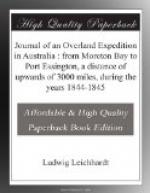Dec. 11.—We travelled about seven miles N.N.W. over an immense plain, with forest land and rising ground to the eastward, in which direction four prominent hills were seen, one of which had the abrupt peak form of Biroa in Moreton Bay. The plain appeared to be unbounded to the westward. When we approached the forest, several tracts of buffaloes were seen; and, upon the natives conducting us along a small creek which came into the plain from the N.N.E., we found a well beaten path and several places where these animals were accustomed to camp. We encamped at a good-sized water-hole in the bed of this creek, the water of which was covered with a green scum. As the dung and tracks of the buffaloes were fresh, Charley went to track them, whilst Brown tried to shoot some Ibises, which had been at the water and were now perched on a tree about 300 yards off. At the discharge of the gun a buffalo started out of a thicket, but did not seem inclined to go far; Brown returned, loaded his gun with ball, went after the buffalo and wounded him in the shoulder. When Charley came back to the camp, he, Brown and Mr. Roper pursued the buffalo on horseback, and after a long run, and some charges, succeeded in killing it. It was a young bull, about three years old, and in most excellent condition. This was a great, a most fortunate event for us; for our meat bags were almost empty, and, as we did not wish to kill Redmond, our good companion, we had the prospect of some days of starvation before us. We could now share freely with our black friends, and they had not the slightest objection to eat the fresh meat, after baking it in their usual manner. They called the buffalo “Anaborro;” and stated that the country before us was full of them. These buffaloes are the offspring of the stock which had either strayed from the settlement at Raffles Bay, or had been left behind when that establishment was broken up. They were originally introduced from the Malay islands. I was struck with the remarkable thickness of their skin, (almost an inch) and with the solidity of their bones, which contained little marrow; but that little was extremely savoury.
We had a heavy thunder-storm at 10 o’clock at night from the southward.
Dec. 12.—Part of the meat was cut up and dried, and part of it was roasted to take with us; a great part of it was given to the natives, who were baking and eating the whole day; and when they could eat no more meat, they went into the plains to collect “Imberbi” and Murnatt, to add the necessary quantum of vegetable matter to their diet. The sultry weather, however, caused a great part of the meat to become tainted and maggotty. Our friend Nyuall became ill, and complained of a violent headache, which he tried to cure by tying a string tightly round his head.
The black ibis, cocatua, kites, crows, and a small black and white species of heron, frequented our water-hole.
The night was extremely close, and, to find some relief, I took a bath; which gave me, however, a very annoying inflammation of the eyes.




